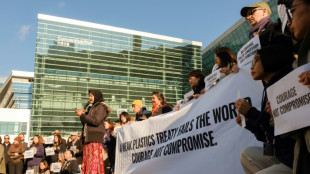
-
 British MPs debate contentious assisted dying law
British MPs debate contentious assisted dying law
-
Macron offers first glimpse of post-fire Notre Dame

-
 Syria jihadists, allies shell Aleppo in shock offensive
Syria jihadists, allies shell Aleppo in shock offensive
-
Japan government approves $92 bn extra budget

-
 Toll in Syria jihadist-army fighting rises to 242: monitor
Toll in Syria jihadist-army fighting rises to 242: monitor
-
UK transport secretary quits in setback for Starmer

-
 Days before deadline, plastic treaty draft highlights disagreement
Days before deadline, plastic treaty draft highlights disagreement
-
Crypto boss eats banana art he bought for $6.2 million

-
 Teen news boss criticises Australian social media ban
Teen news boss criticises Australian social media ban
-
Taiwan detects 41 Chinese military aircraft, ships ahead of Lai US stopover

-
 Spain urged to 'build differently' after deadly floods
Spain urged to 'build differently' after deadly floods
-
WTO chief faces heavy task as Trump threat looms

-
 Herbert takes control at Australian Open as Smith tanks
Herbert takes control at Australian Open as Smith tanks
-
Israel PM again warns Iran after top diplomat talks of revising nuclear doctrine

-
 Brilliant Brook's 132 puts England on top against New Zealand
Brilliant Brook's 132 puts England on top against New Zealand
-
US landmine offer to Ukraine throws global treaty into 'crisis': campaign group

-
 Singapore hangs 4th person in three weeks
Singapore hangs 4th person in three weeks
-
Five things to know about NewJeans' shock split from agency

-
 Waste pickers battle for recognition at plastic treaty talks
Waste pickers battle for recognition at plastic treaty talks
-
Ireland votes in closely fought general election

-
 Top UN court to open unprecedented climate hearings
Top UN court to open unprecedented climate hearings
-
European countries that allow assisted dying

-
 British MPs to debate contentious assisted dying law
British MPs to debate contentious assisted dying law
-
Schmidt not expecting hero's welcome on Ireland return

-
 PSG stuck between domestic dominance and Champions League woes
PSG stuck between domestic dominance and Champions League woes
-
'Hot fight' as unbeaten Bayern visit Dortmund fortress

-
 Bordeaux-Begles' Samu 'not finished yet' with Wallabies
Bordeaux-Begles' Samu 'not finished yet' with Wallabies
-
Brook and Pope half-centuries haul England to 174-4 against NZ

-
 Yen rallies on rate hike bets as equity markets swing
Yen rallies on rate hike bets as equity markets swing
-
Ukraine superstar Mahuchikh brings 'good vibes' to her war-torn country

-
 PlayStation at 30: How Sony's grey box conquered gaming
PlayStation at 30: How Sony's grey box conquered gaming
-
Saudi Arabia hosts UN talks on drought, desertification

-
 PlayStation: Fun facts to know as Sony's console turns 30
PlayStation: Fun facts to know as Sony's console turns 30
-
Nepal's first transgender candidates run for local office

-
 Father of PlayStation says 'everyone told us we would fail'
Father of PlayStation says 'everyone told us we would fail'
-
Ireland seek to overcome former coach Schmidt's Wallabies

-
 Detroit survive Bears comeback to make it 10 wins in a row
Detroit survive Bears comeback to make it 10 wins in a row
-
Mexican actor Silvia Pinal dead at 93

-
 'Black Friday' deals target inflation-weary US consumers
'Black Friday' deals target inflation-weary US consumers
-
Liverpool look to deepen Man City crisis, Amorim seeks first Premier League win

-
 England lose three quick wickets in reply to New Zealand's 348
England lose three quick wickets in reply to New Zealand's 348
-
Social media companies slam Australia's under-16 ban

-
 Canada watchdog sues Google over 'anti-competitive' ad tech
Canada watchdog sues Google over 'anti-competitive' ad tech
-
Hojlund gives Amorim winning Old Trafford bow, Roma hold Spurs

-
 Amorim wins first Man Utd home game after rollercoaster ride
Amorim wins first Man Utd home game after rollercoaster ride
-
France arrests 26 as South Asian migrant trafficking ring smashed

-
 At least 15 dead, 113 missing, in Uganda landslides
At least 15 dead, 113 missing, in Uganda landslides
-
Netanyahu threatens 'intensive war' if Hezbollah breaches fragile truce

-
 Bilbao join Lazio at Europa League summit, Chelsea cruise in Conference League
Bilbao join Lazio at Europa League summit, Chelsea cruise in Conference League
-
In Lebanon's Tyre returning residents find no water, little power


Spain urged to 'build differently' after deadly floods
Spain is racing to reconstruct areas devastated by deadly floods last month but experts have urged a rethink of development with the relocation of buildings away from vulnerable areas.
The worst floods to hit Spain in decades on October 29 killed at least 230 people, covered towns in mud and debris, destroyed bridges, roads and rail lines and submerged cars, mainly in the eastern region of Valencia.
"The degree of destruction and ruin was historic" in the Valencia region, where some 80 towns were hit by torrential rains, according to a report from Spain's Higher Council of Colleges of Architects.
Reconstruction must "be carried out with empathy, technical rigour and a great deal of responsibility," said its president Marta Vall-Llossera.
"With global warming making meteorological phenomena more intense and more frequent, architecture will have an important role to play," she told AFP.
"We're going to have to build differently," she added, recommending a return to "the traditional, compact Mediterranean city".
In Spain's third-largest city Valencia, the regional capital, land has become increasingly built up, making it more vulnerable to flooding since concrete prevents the ground from absorbing water.
In the Valencia suburb of Paiporta, epicentre of the disaster, roads were quickly transformed into torrents of mud that swept away everything in their path.
"We must try to re-naturalise cities, reduce the use of cars, make the cobblestones less hard, more permeable, and better able to withstand the intense heat and torrential rain," said Vall-Llossera.
- 'Forced expropriation' -
A flood risk prevention plan was approved in the Valencia region in 2003 but it is not binding and has no "retroactive effects", said Maria Jesus Romero Aloy, an expert in urban planning law at Valencia's Polytechnic University.
Valencia accounts for just five percent of Spain's territory which is at risk of flooding but has seen 20 percent of the heavy rainfall events recorded over the past decade in the country, according to the plan.
The highest risk of flooding is concentrated in 12 percent of the region -- home to the popular beach resort of Benidorm -- and affects 600,000 people.
In this area, the authorities recommend homes have watertight windows and an internal staircase with roof access to allow for an escape from flash flooding.
But Romero Aloy said there has to be a "rethinking the territorial model and considering removing buildings or installations that face a high risk" of flooding.
Property owners are currently allowed to rebuild on flooded land even in a high-risk zone.
The only way to prevent this is through a "forced expropriation" as happened in 2019 in Onteniente, a municipality some 85 kilometres (50 miles) south of Valencia.
There "a neighbourhood was eliminated" and turned into a floodway, a channel reserved for floodwaters to pass through, said Romero Aloy.
- 'Natural barriers' -
Mayors, however, are "reluctant to expropriate" because it is a "complicated political decision", especially when the country faces a housing shortage, she added.
But a month after the floods "there is a growing awareness among decision-makers," said Federico Jesus Bonet Zapater, an expert in civil engineering, canals and ports who advises the regional government of Valencia.
"Projects to build dams or divert canals, which have been on the table for some time, are finally going to be studied," he added.
Rafael Delgado Artes, an expert in regional planning and risk prevention, recommends creating "natural barriers" such as forests to minimise the damage from floods and "artificial riverbeds to divert rivers away from city centres".
In the centre of Valencia, which was spared the October disaster, the river that runs through the city was diverted after devastating floods in 1957 and in its place stands a popular urban park.
A.P.Maia--PC
